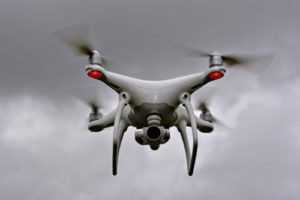
A bill passed unanimously through the House Homeland Security Committee would prevent numerous U.S. government agencies from purchasing drones manufactured in certain countries, including China.
The Drone Origin Security Enhancement Act, proposed by Rep. Dan Crenshaw (R-Texas), would prohibit the Department of Homeland Security (DHS) from purchasing or operating unmanned aircraft systems (UAS) and associated technologies manufactured in foreign nations considered to be strategic competitors, which seems to be defined as Russia and China. Crenshaw’s office did not immediately respond to provide clarification.
Concerned with security issues and potential data-sharing between Chinese drone companies and Beijing, the Pentagon recently banned the use of drones built by Chinese drone giant DJI, which controls the majority of the small UAS market.
“We don’t have much of a small UAS industrial base because DJI dumped so many low-price quadcopters on the market, and we then became dependent on them,” said DoD chief procurement officer Ellen Lord in August of this year. In an effort to bolster domestic defense industrial base capability, DoD is launching what it calls a “Trusted Capital Marketplace” to connect sources of capital with small tech firms. The first meeting in October will focus on the small UAS sector.
DJI doesn’t currently have government contracts with any agencies within the Department of Homeland Security, but their off-the-shelf products are often purchased by government agencies for general use. Current language of the House bill also prohibits entities that DHS “provides financial assistance for” from using drones from targeted countries, which — depending on how language is interpreted — could affect many first responder programs that have invested in DJI equipment.
DJI criticized the bill’s advancement as a move that “broadly and unfairly targets technology manufactured in China.”
“Independent cybersecurity investigations have proven our drones do not automatically send flight data to any third party including DJI and we give all users full control over the data they collect as well as tools to manage where it is stored and how it is shared,” DJI said in a statement, suggesting Congress develop general standards for drone safety and security rather than target China. “We urge Congress to work with government agencies, drone operators, and industry experts to develop these standards on drone technology instead of a misguided country of origin restriction.”
The bill’s Senate companion, the America Security Drone Act introduced by Sen. Rick Scott (R-Fla.), contains a few key differences, including a broader scope, as it prevents any federal department or agency from purchasing or operating UAS manufactured or assembled by a covered foreign entity.
The Senate bill also targets China by name, as well as “any entity subject to influence or control” by the Chinese government, as determined by the Secretary of Homeland Security.
“This technology continues to pioneer a new frontier, but we cannot ignore the threats it poses to the homeland,” said Crenshaw. “Our bill ensures American drone technology will be free from Chinese influence, which is crucial because it’s been demonstrated time after time that we cannot trust Chinese technology in sensitive national security hardware.”
Both bills allow exemptions for national security interest, counter-UAS testing and intelligence, electronic warfare or information operations. The Senate Committee on Homeland Security and Governmental Affairs doesn’t have any markups scheduled in the coming weeks, according to committee staff.
Another bill approved by the House Homeland Security Committee earlier this week, H.R. 3787, would establish a Countering Unmanned Aircraft Systems Coordinator position within DHS.